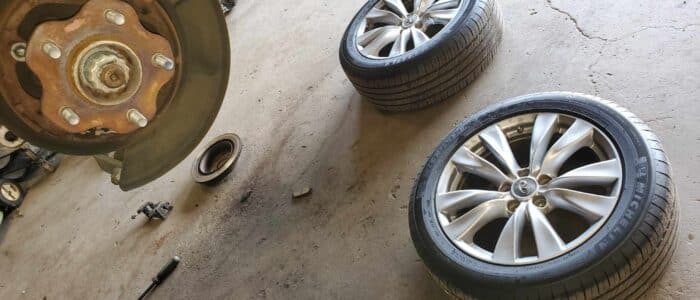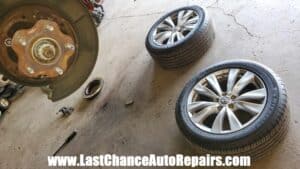
 Having brake problems near me? From a faint hardly noticeable noise to a violently shaking steering wheel, brake problems are not something to be ignored.
Having brake problems near me? From a faint hardly noticeable noise to a violently shaking steering wheel, brake problems are not something to be ignored.
Brake problems come in so many different flavors so to say. If put off for too long, may lead to serious safety problems and or costly, unwanted, could have been prevented, funds coming out of your bank account. Troubleshooting your brake problems starts with you.
Troubleshooting Brake Problems Isn’t Rocket Science
Is your brake fluid low?
Has your brake light been on? If so, that is definitely a brake problem.
Typically your brake light will come on when your brake fluid is low. You can look at it like no brake fluid, no brakes = no stop. Your vehicle’s brake system requires a certain amount of fluid in order to work properly. When the brake fluid reservoir is low it can severely impact the brakes from stopping safely if at all and/or is a sign that the brake pads/shoes are in need of replacement.
Has your ABS light been on?
A properly working anti-lock brake system is key to stopping safely on a dime every time your brake pedal is activated. A vehicle’s ABS helps prevent your brake lock up which typically occurs during emergency braking and or also prevents your tires from losing contact on wet, snowy, slippery roads when braking. Do you see an “ABS” warning light on your dashboard? Stop by our brake shop in Plainfield, IL, ASAP!
ABS aka anti-lock brake system problems include: a damaged ABS tone ring or the most common faulty speed sensor (which in some cases instead of being replaced can simply be cleaned of contaminates, debris and or metal shavings that stick to the sensor tip). Need a brake problem troubleshooted, call Plainfield’s top brake shop hence auto repair shop Last Chance Auto Repair and schedule a diagnostic test to determine what’s triggering your ABS warning light today.
Does your brake pedal feel spongy?
Has your brake pedal been going lower and lower to the floor as of late? When you apply your brakes does the 1st thing that comes to mind it sponginess? Your brakes should be looked at pronto.
Brake problems that cause the spongy brake effect include:
- Most common culprit that causes spongy brakes is air in the brake system. Why is there air in the brake system you wonder? A vehicle’s brake system is designed to be air-tight, but, air can make an appearance if you consistently drive with worn-out brake pads/shoes, failing brake calipers and or brake pistons. If your brake system has air in it sometimes the simple solution is to just bleed your brakes. Unfortunately it isn’t always as easy as just bleeding your brake system.
- Damaged brake lines will leak like a sieve if left to. Rust is similar to a finishing move in a Mortal Combat, when the brake lines rust bad enough they become brittle, porous, leak, and then KO. Rust isn’t the only brake line killer, the damage create in a car crash or when you run over a curb or even a speed bump can cause brake lines to bend, smash, collapse, tear, and or fracture.
- Low brake fluid is a brake problem typically caused by another brake problem of some form. When your brake system doesn’t have enough brake fluid and or even old should have been replaced years ago dirty brake fluid it can lead to small to large brake problems that in most cases could have been prevented with some TLC otherwise known as brake maintenance.
- Do you know what your master cylinder is?
Your vehicle’s brake master cylinder is the 1st (besides the brake pedal) brake part in the braking system, which is set in motion and actuated by pressing the brake pedal with your foot. The brake pedal when applied will then push a piston through the master cylinder which then forces brake fluid through the brake lines to the brake calipers & brake wheel cylinders throughout the brake system. In return this process drives the pistons that force the brake pads, brake shoes hence friction material against the brake rotors and or brake drums, which in return stops the wheel. Are you having brake problems?
A faulty master cylinder may not be able to send the brake fluid properly to it’s destination for a multitude of reasons. If this sounds like the brake problems you are having it can result in things being more difficult for your brake system to stop your car when applying the brakes.
When you brake does your steering wheel shake?
A shaking steering wheel can be caused by quite a few different problems. If your vehicle’s steering wheel is shaking abnormally, it could be caused by faulty wheel bearings, tie rods, ball joints, control arm bushings but then again it could be your brakes and or a combination of several components. Regardless, when your steering wheel is shaking it means something is going on and you should get it looked at ASAP.
Brake problems that cause a steering wheel to shake include:
Worn out brake pads = brake problems. Riding around with worn brake pads can overtime give you a shaky feeling in the steering wheel. Old, worn out, and or even dirty brake pads that aren’t gripping the brake rotor properly, may give you a little shake in the steering wheel to let you know something is going on. In most cases the shakiness starts very faintly which should allow you plenty of time to make an appointment over at a brake repair shop near me like Last Chance Auto Repair to get things rectified.
Dry guide pins & slides = brake problems. If your car isn’t braking like it use to and you are noticing a vibration in your steering wheel, the offender could be dry guide pins & slides. Guide pins & slides are part of your brake calipers. They guide the brake pads to slide back and forth over the rotor. Dry or corroded brake pins & slides can cause the brake calipers to stick a bit (in some cases seize) or an incorrect angling of the brake pads when pressed against the rotor surface. This will cause a shaky steering wheel.
Warped brake rotors / brake drums = brake problems. Has your steering wheel been shaking and or the brake pedal pulsating? If this seem all to familiar, the brake rotors and or drums may need a little love. Over time, after so much heating and cooling the rotors and drums can and will wear / warp, which will lead to this braking and steering shaking sensation aka brake problems.
Have your brakes been making noise?
Are your brakes making noise? Brake noises = brake problems. Noises that brakes will make to give you a heads up that it may be time for a brake replacement service include: grinding, squealing, squeaking, clattering or maybe even a rattling sound.
Worn out brake pads or shoes can and will over time affect your vehicle’s braking distance and or leave you with an extremely larger than normal brake repair bill if neglected. Doing something about brake noises sooner than later can pay for itself in the long run.
Brake Service In Plainfield At Last Chance Auto Repair
Make sure your brakes are there for you when needed by getting a periodic brake system inspection which is typically free w/any paid service or not at most “auto repair shops near me“.
Are you having brake problems near me? Make an appointment at Last Chance Auto Repair and take advantage of our free brake inspection. We have your brake service needs covered A-Z.
